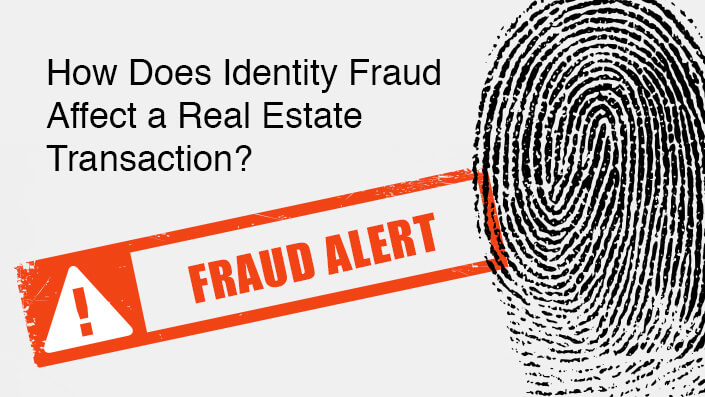
I have identified that there are four Fraud threats that affect a real estate transaction. Wire Fraud, Check Fraud, Identity Fraud and Email Fraud.
In this article we are going to talk about Identity fraud and how that affects the real estate transaction.
First of all, let’s back up and look at the role of the Settlement Agent in a real estate transaction. If you have read my other Fraud articles, the following paragraphs will look very familiar.
What is the main purpose of the Settlement Agent? We are the impartial, neutral third party whose responsibility is to hold funds and documents handed us in trust in a real estate transaction until mutually agreed upon conditions have been met, at which time instructions for the disbursement and handling of the funds and the documents are carried out.
The importance of “hold funds and documents” cannot be overemphasized. Parties put their trust in the settlement agent and this trust must not be broken.
Unfortunately, with rapid advancement of technology and the subsequent rapid disbursement of information through many venues, the fraud “industry” has bloomed like weeds after a good spring rain. Wire fraud, email fraud, check fraud, identity fraud. So many types of fraud, so many fraudsters who become more daring and more innovative every day. The settlement agent is hard-pressed to keep up.
Our articles on wire fraud, check fraud and email fraud are on our website for your review. With this article I would like to bring attention to the different types of identity fraud that can be perpetrated in a real estate transaction. Identity fraud may not get the same news coverage, may not be as horrifying in loss amount as wire fraud at this time, but it is still fraud. If you have something of value, there will be people out there who are thinking of ways to part you from it.
THE IMPERSONATOR
Mr. Husband brings in a woman and introduces her as his wife to sign the Quitclaim Deed on a property that he is selling. Under California’s community property law, a spouse who purchases or sells real property must take into consideration the spouse’s possible interest in the property. If the person is purchasing or selling as a married person then we ask that he/she bring in the spouse to sign a quitclaim deed to acknowledge that the spouse is releasing their possible interest. The deed is duly signed and notarized, confirming that she is the person on the driver’s license. The transaction closed.
A couple of years later a woman calls regarding this particular transaction. To our surprise, she said she was the wife of the seller and she had never signed a quitclaim deed. In the midst of her divorce from her husband, an inquiry into his assets brought forth this piece of property which she, as the wife, had a community property interest in. So, if she was the wife, then who was the person who impersonated her to sign the deed?
It used to be that wives normally would take the last name of the husband after marriage, but that is not a given anymore, especially among career baby boomer women. Many women keep their last name. This is also true of foreigners and I would say that only 40% of the wives take the husband’s last name. For instance, I am Juliana Tu and my husband is Kenneth Ma, but sometimes he gets called Mr. Tu instead of Mr. Ma, much to his amusement.
When a spouse comes in to sign a quitclaim deed we don’t ask for a copy of a marriage certificate to substantiate that the person is the spouse. John Smith comes in, introduces his wife as Anna Brown, we prepare the quitclaim deed, we match the signature and face to the identification given and that’s it. We trust John and Anna that they are who they claim to be. Perhaps we are too trusting?
Nothing developed from the original transaction with the wronged ex-wife but a very important lesson was learned. As Settlement Agents we needed to make sure that a person executing a document take responsibility for the content of the document, its veracity, and what is claimed. A quitclaim deed whereby a spouse relinquishes interest should state “ Juliana Tu, a Married Woman and spouse of Grantee herein….. hereby quitclaims her interest to Kenneth Ma, a Married Man as his Sole and Separate property”. The full title and vesting with a proclamation of the relationship between the persons would have been more correct than a simple “Juliana Tu hereby quitclaims her interest to Kenneth Ma” with no mention of title or relationship. As the signer of such a deed which shows my relationship as the spouse, I would also be making a declaration to which the Settlement Agent could rely on its truthfulness.
THE FORGER
A woman purchased a property for her brother as he couldn’t qualify for the loan. She then deeded the property to him after closing. A few years later, as the equity in the property built up, she decided that the property had a nice bit of equity in it that wasn’t being used and it was time to cash it out.
It didn’t matter that the woman was no longer the owner of the property; she forged her brother’s signature and, with the help of an unscrupulous notary, recorded an ownership deed back into her name. With her name showing on the ownership she proceeded with her plan to refinance and cash out.
Close to the conclusion of the transaction, her brother found out about her scheme when he received notification from the property insurance company about a change to the name of the insured. I am sure that was received with quite a bit of surprise and outrage. He immediately forced his sister to deed the property back to him.
This deed returned the property to the brother but the woman never told the Settlement Agent and continued on with the refinance. It was very unfortunate that the Title Company which was going to insure the transaction fell asleep at the wheel and did not locate this new deed before the refinance was completed. The woman got the proceeds from the refinance, used it to buy personal stuff and skipped town. As lawsuits and counter suits flew back and forth the fraudster moved to Australia, beyond the lawsuit’s reach.
THE ARBITRARY CLICKER
Should we accept electronic signatures? It’s darned if we do and darned if we don’t situation. This is what happens as technology advances and many platforms featuring the ease of electronic signatures are introduced. Now everyone wants the ability to transact complex transactions on their phones. Viva Escrow struggled with accepting this new technology for years. It was a quandary. We could make it available for the convenience of our clients, but do we know who is on the computer or telephone clicking/signing away? It could be a son or a sister, or even a neighbor who is helping the non-tech client.
I know of at least one case in which a contingency removal form was signed electronically by a supposed Buyer. As it turned out, there were unresolved property condition issues. The contingency should not have been removed and the transaction should not have closed. It came out in the lawsuit that the physical contingency removal form was “clicked/signed” by the Buyer’s real estate agent.
THE RELATIVE
A Seller comes to our office to sign a deed in front of the Settlement Agent, who was also the Notary Public. Looking at the driver’s license that was handed to her the Settlement Agent couldn’t help but comment to the signer that the picture in the ID made her look much older. She then asked the client to sign her notary book and the signature flow just didn’t come out very smoothly.
Escrow instincts kicked in and the Settlement Agent told the client that she just couldn’t do her notary. It turns out the lady who came in was the Seller’s sister. The Seller left the country and the sister was signing all the paperwork, without the benefit of an actual Power of Attorney form given. Exasperated with the naivete of the client (what, she didn’t think we would catch on?) and the delay this whole issue would cause to the whole transaction the Settlement Agent gave the sister a whole new transaction package and asked that our real Seller go to the American Consulate to get the deed notarized.
What were they thinking?
How about the story of a son who almost got away with selling his father’s property from right under him? He had the exact same name as his father. The paperwork was signed and notarized outside of the office. The Settlement Agent did not meet the purported Seller, and it was by luck and chance that a family member found out about the pending sale and alerted the Settlement Agent. When contacted the Notary Public provided a copy of the driver’s license which showed the same name, same address. The real Seller was apparently much older and might have not had all his mental capabilities. That was surely a disaster averted by divine grace.
Which leads me to the next section in this article, the importance of …
THE NOTARY PUBLIC
When I first got into this industry the clients all came into the office to sign their paperwork in my presence. I wore two hats – that of the Settlement Agent and the other of the Notary Public. That was almost 40 years ago and things have changed. It is a 50-50 chance that the clients will actually sit in front of us to sign their paperwork.
The role of the Notary Public out in the field has evolved into one in which they become the surrogate for the Settlement Agent. We rely on the Notary Public to ascertain two things: first of all, that the persons signing in front of them are who they are supposed to be and secondly, that they understand and acknowledge what they are signing. The second is just as important as the first. We have all heard of elder abuse and even when there is no such abuse, we all understand the difficulties of onset dementia or Alzheimer’s.
The newest topic of discussion as this article is being written (2018) besides E-closings, is Remote Online Notarizations (RON). Settlement Agents in California, and I am sure that it is probably true nationwide, are very concerned with this new area that technology is taking us into. We have very strict notary laws in California. Getting a notary appointment is not easy: 3-6 hours continuing education class, a test in which no purses, phones, even jackets are allowed at the testing area, fingerprinting and DOJ background review.
But that is California. Other states may not have such strict regulatory guidelines. The concern, therefore, is “interstate recognition” – recognizing and accepting the notarial acts done in other states. Notary laws across the nation are so different, we have to place our faith that said laws will provide guidance and training to those taking on this position and educate them as a deterrence to fraud and identity theft before they notarize that document that could change someone’s life.
A personal comment:
I would really like a strict national (federal) standardized notary law. There would be less worry for Settlement Agents nationwide when we feel we can rely on notaries in any state having the same training and taking the same proper steps of scrutiny and identification. Fraud has to be prevented every step of the way in a transaction and every notary has to be aware that he/she is a big part of that prevention.
In today’s environment, it is tough to safeguard our clients’ funds and documents. In the matter of notarizations, sometimes we can’t even figure out if we have the right person sitting in front of us signing that deed. Can you imagine if we were to do this through a webcam in a remote online notarization?
OVERSEAS CLIENTS
The example of the out-of-country Seller brings me to a particular subject that is a concern in my area, where many Chinese investors flock to purchase properties, as well as all other areas where international clients make their investments. Here are the issues:
- We rarely meet our clients
- We rely on the real estate agent to be the go-between
- Notarization of documents means we rely on the American Consulate to do a good job scrutinizing the ID of our client before doing the notarization.
- Even with a phone number and email of the client, are we able to communicate with them and make sure they understand and acknowledge the process?
I ask my Real Estate agents to provide me with an email address and a phone number for the out-of-town or out-of-country client. In my case, I am lucky that I can speak Chinese and I can read and write. Or at the least I can use Google Translate. I will attempt to communicate with them via email and will always call them via Skype to confirm their wire proceeds instructions and advise them of the amount that they are receiving when we do the closing.
But what if we don’t speak or read their language? How do we ascertain that they understand and agree to the transaction? How do we know the real estate agent here is representing them appropriately? Would this be a ripe opportunity for identity fraud, something that a Settlement Agent can be caught up with years later? Each Settlement Company has to come up with its own management decisions and set up its own procedures. It is something to be seriously considered.
TIPS TO TAKE AWAY
For those of you who are Settlement Agents, and even if you are not, I offer you the following:
- Learn to say “No”
- Trust no one
- Follow your gut instincts
- Don’t be afraid to ask for help
- Set up good office procedures and best practices and make sure everyone in the office follows them
- Do communicate and contact your clients through the transaction
- Educate yourself constantly! The Fraudsters do! You can do no less.
We hope you found this brief overview of importance and that it provided some clarity on this topic. The examples given are real ones (unfortunately) and there are probably many others encountered by other settlement professionals. Check out our other fraud articles on our website, as well as our short video presentations.
You have questions? We have answers!


Juliana Tu, CSEO, CEO, CBSS, CEI, SASIP
Escrow Manager

Good news! “The Art of Escrow” is out! Look for it on www.amazon.com!

The Art of Escrow:
The Fight For Your American Dream and the Pursuit of Homeownership
Available now at Amazon.com
- Threats to Escrow – Part 5 – Document Fraud! - May 19, 2023
- When the Loan Got Sold and You Just Closed Escrow - April 6, 2020
- Mechanics Lien - October 7, 2019
- Are You a Foreigner and Need to Know About U.S. FIRPTA Withholding Laws? - February 20, 2019
- When the FIRPTA
Withholding Goes Wrong - February 20, 2019
Join Our FREE Viva Escrow Forums
